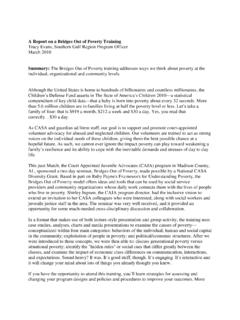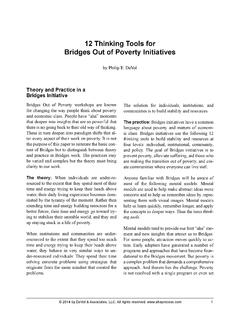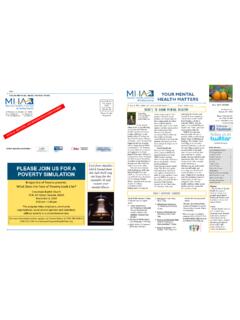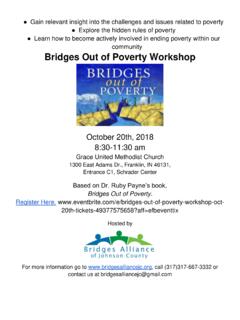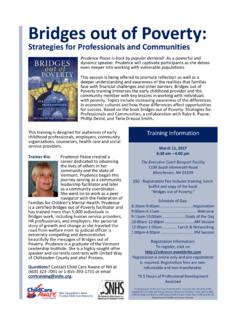Transcription of Bridges Out of Poverty
1 1 Bridges Out of Poverty Study Guide Based on Bridges Out of Poverty : Strategies for Professionals and Communities by Ruby K. Payne, , Philip E. DeVol, and Terie Dreussi Smith Prepared by Monica Bein, Consultant and Terie Dreussi Smith, Ed. Author, Consultant 2 Bridges Out of Poverty Study Guide Prepared by Monica Bein and Terie Dreussi Smith 43 pp. Based on Bridges Out of Poverty : Strategies for Professionals and Communities by Ruby K. Payne, Philip E. DeVol, & Terie Dreussi Smith (1999, 2006) ISBN 13: 1-978-934583-64-7 ISBN 10: 978-934583-64-2 1. Education 2. Sociology 3. Title Copyright 2012 by aha! Process, Inc. Published by aha! Process, Inc. All rights reserved. Printed in the United States of America. No part of this book may be reproduced in any manner whatsoever without written permission except in the case of brief quotations embedded in critical articles and reviews.
2 For information, contact aha! Process, Inc., Box 727, Highlands, TX 77562-0727; fax (281) 426-5600; website: Copy editing by Dan Shenk Study guide design by Paula Nicolella 3 TABLE OF CONTENTS Preface 4 Module #1 Introduction and Mental Models 5 Module #2 Research 14 Module #3 Key Points 18 Module #4 Hidden Rules 21 Module #5 Family Structure 24 Module #6 The Role of Language and Story 27 Module #7 Resources 29 Module #8 Building Relationships, Part I: 32 Social Capital and Mentoring Module #9 Building Relationships, Part II.
3 34 Resiliency Resources Module #9 Mediation and Bridges Tools 36 Next Steps: Design/Redesign 39 Closing Thoughts 43 4 PREFACE Thank you for becoming part of the Bridges Out of Poverty movement. The part you play as an individual, as a professional, and/or as a community catalyst is the core of the initiative. Our principal contribution to addressing Poverty is to offer a common understanding of Poverty and a shared language for all the topics that will arise when we come together to solve community problems. This Bridges study guide has been developed for people who work for organizations or business that work with or employ individuals in Poverty . It also is designed for those serving on community and sector committees, Bridges Out of Poverty Steering Committees, and Guiding Coalitions within the Circles initiative.
4 Finally, it is intended for individuals building relationships with others from diverse economic class settings, such as mentors or allies. This guide is to be used as a companion piece to the Bridges Out of Poverty book, as well as the Bridges Out of Poverty DVD series, should that be available to you. Ideally, the study guide would be used in a group setting with an experienced Bridges -certified trainer, but it also can be used as an individualized learning experience. In some areas the Bridges content is provided by aha! Process consultants or Bridges -certified trainers. Where it isn t feasible to bring in national trainers or send local trainers to be certified, this training solution was necessary. The information you receive in this format is similar to what individuals who may be in situational or generational Poverty receive when completing 20 sessions of the workshop Getting Ahead in a Just-Gettin -By World (created initially by Philip DeVol and later enhanced by workshop participants).
5 Getting Ahead is offered in facilitated groups of 5 12 people. Within this setting, people investigate the impact of Poverty on themselves and their community. If you are working with individuals who have completed Getting Ahead, such as a Circle Leader, the Getting Ahead graduates will have: Explored everything you will find in this study guide Complete a detailed self-assessment of their internal and external resources Done an assessment of their community Developed a plan to build resources Prepared themselves to assist their community in ending Poverty When people from diverse economic settings work together to problem-solve the issue of Poverty or other community concerns, individuals from different economic environments will be speaking a common language and using familiar terms. Everyone also will be aware of his or her own hidden rules of class, along with the hidden rules that others use.
6 We anticipate that this learning experience will deepen the relationships that you develop with one another and make us all more effective at creating prosperous, healthy, sustainable communities. 5 MODULE #1 Introduction and Mental Models Introduction Economic realities of Poverty , middle class, and wealth impact individuals, communities, systems, and structures. In order to positively impact the education and lives of individuals in Poverty , we must explore the way we think and behave. This module offers a structure to help us assess the mindsets and world views we hold as individuals, institutions, and communities. It helps us define and visualize the experiences in economic-class environments in order to increase our understanding. Social Class vs. Economic Class When we judge ourselves against how others are doing, we are positioning ourselves on the ladder of social class.
7 Economic class is different; it s about how stable our life is. Looking at economic class in a nonjudgmental framework allows us to respect one another and evaluate the resources and choices available to us that may not be available to others. This work is based on the premise that everyone should have the resources to envision and develop a positive future story. People living in Poverty throughout the world, including the United States, are typically wrapped in the immediacy of trying to solve problems for today. It is the nature of life in Poverty ; tomorrow may not be a given. In fact, even having a sustainable today may not be possible. This experience has been described as living in the tyranny of the moment. The longer and deeper this moment-driven experience, the less likely it is that individuals will have access to or think in terms of future story.
8 Many people live without the opportunity to make a difference in their communities. The community is often reluctant to value the experience and contributions of those in Poverty . For the individual in Poverty , that sense of powerlessness often makes it hard to get much traction to make necessary personal changes. This work focuses on how a person can get to the point of having a future story through creating choices and developing his or her own power. Just as importantly, this module assists institutions and communities in avoiding the mindset that Poverty is both inevitable and perpetual and helps individuals, institutions, and communities move toward ending the powerlessness of the mindset that says Poverty will always be with us. It is our contention that this change is impossible with the development of relationships of mutual respect, which also can be called social coherence.
9 This is one of the key driving forces of Bridges Out of Poverty . No significant learning occurs without a significant relationship. Dr. James Comer 6 Mental Models A mental model is an internal picture, two-dimensional drawing, or representation of information that aids us in taking abstract information to a concrete level. Mental models are helpful when exploring the concrete experiences of people in generational Poverty . Such models and images tend to exist below our awareness and can influence the way we think and act unless we consciously think about them. 7 Mental Model for Poverty Create a mental model as a group by using the blank circle below. Think of someone you know who has lived in Poverty two or more generations. Write or draw in the circle what the person worries about and how he or she usually spends time. Then, think of a pocket of Poverty in your community and list the businesses present in that part of your city or town.
10 When you are finished, compare your mental model with the mental models that follow. Businesses List businesses you may see in a Poverty neighborhood .. 8 Mental Model for Middle Class Create a mental model for middle class by writing or drawing in the circle below how a person in middle class may spend his or her time in a typical day. Then, think of a pocket of middle class in your community and list the businesses present in that part of your city or town. When you are finished, compare your mental model with the mental models that follow. Businesses List businesses you may see in a middle-class neighborhood .. 9 Church SchoolsPolice Social Services Compare and contrast your mental models with the following: Pawn shop Liquor store Corner store Rent to own Laundromat Fast food Check cashing Temp services Used-car lots Dollar store Businesses10 Church SchoolsPolice Social Services Compare and contrast your mental models with the following: Shopping/strip malls Bookstores Banks Fitness centers Vet clinics Office complexes Coffee shops Restaurants/bars Golf courses Businesses11 Tyranny of the Moment The experience of Poverty has been described (by Paulo Freire) as living in the tyranny of the moment.


